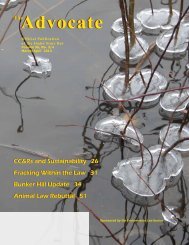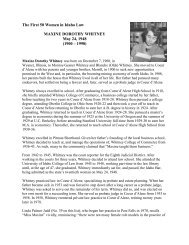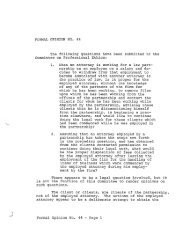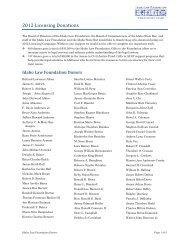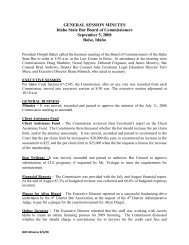The Advocate - May 2012 - Idaho State Bar - Idaho.gov
The Advocate - May 2012 - Idaho State Bar - Idaho.gov
The Advocate - May 2012 - Idaho State Bar - Idaho.gov
Create successful ePaper yourself
Turn your PDF publications into a flip-book with our unique Google optimized e-Paper software.
38 <strong>The</strong> <strong>Advocate</strong> • <strong>May</strong> <strong>2012</strong><br />
Mediate, Arbitrate or Litigate:<br />
What Would Lincoln Do?<br />
Hon. Larry M. Boyle<br />
United <strong>State</strong>s District Court<br />
Several months ago I accepted an invitation<br />
to speak at the <strong>2012</strong> Texas <strong>State</strong><br />
<strong>Bar</strong> annual meeting. One of the topics is<br />
the vanishing trial and the role ADR has<br />
played in that decline. My assigned topic<br />
is Mediate, Arbitrate or Litigate: What<br />
would Lincoln do?<br />
Abraham Lincoln wasn’t<br />
perfect, either as a man or as<br />
a lawyer. In fact, Lincoln<br />
had many critics, some calling<br />
him overrated and others<br />
arguing his larger than life<br />
legacy as a lawyer is a myth.<br />
Other critics claim that “Honest<br />
Abe” really wasn’t more<br />
honest than many of his con-<br />
temporaries, did not have a<br />
good knowledge of the law,<br />
and lost cases he should have<br />
won. A former law partner<br />
Hon. Larry M. Boyle<br />
said Lincoln was deficient as a lawyer, described<br />
him as being a case lawyer and nothing more, and<br />
objected to him being called a great lawyer. 1<br />
However, those notions are soundly rejected by<br />
the vast majority of Lincoln scholars. <strong>The</strong> overwhelming<br />
consensus is that Lincoln was a premier<br />
attorney, and one of the most creative, intelligent<br />
and exceptional advocates ever to address a court<br />
or jury.<br />
Lincoln has been called “our most admired and<br />
least understood president.” 2 Assuming that to be<br />
true, how well do we understand Lincoln as a lawyer?<br />
If we can understand how he practiced law<br />
and counseled people involved in a dispute we will<br />
have an answer to the question: “What would Lincoln<br />
do - mediate, arbitrate or take it to a jury?”<br />
Lincoln the man<br />
Most of the material in this article has been<br />
gleaned from Lincoln biographies. In that regard,<br />
Lincoln warns,<br />
Biographies as written are false and misleading.<br />
<strong>The</strong> author of the life of his hero paints him as<br />
the perfect man - magnifies his perfections and<br />
suppresses his imperfections - describes the success<br />
of his hero in glowing terms, never once<br />
hinting at his failures and blunders. 3<br />
But, Leo Tolstoy, a Lincoln admirer, places the<br />
passage of time into perspective,<br />
We are still too near his greatness. But after a<br />
few centuries more of our posterity will find him<br />
considerably bigger than we do. His genius is<br />
still too strong and too powerful for common understanding....<br />
4<br />
Although Lincoln may have been skeptical of<br />
biographies in general, Tolstoy’s prediction has<br />
proved accurate and the abundance of source material<br />
describing Lincoln’s life is staggering. In<br />
fact, historians have suggested that more has been<br />
written about Abraham Lincoln than anyone in the<br />
history of the world, with the exception of perhaps<br />
Jesus of Nazareth and possibly Napoleon. 5<br />
From the multitude of sources, a good place<br />
to begin is Lincoln’s character, which prompted<br />
Justice Anthony Kennedy’s admonishment that we<br />
should adopt “the simple honesty of Lincoln.” 6<br />
It is well known that Lincoln was born into<br />
wretched poverty, had incredibly limited formal<br />
education, was self-taught in the law, had a woefully<br />
unhappy marriage, was of a melancholy personality,<br />
and suffered migraines and depression.<br />
Yet despite all these obstacles and even after the<br />
passage of 150 years, most of us are still moved,<br />
as if reading holy writ, by his Second Inaugural<br />
Address, which promised there would be “malice<br />
toward none, with charity for all. . .” 7<br />
Writing of Lincoln at Gettysburg, a major<br />
American city newspaper observed:<br />
<strong>The</strong> year was 1863. <strong>The</strong> nation was torn by a<br />
civil war that had claimed more than 100,000<br />
lives, and the president was struggling against<br />
virulent political forces eager to abandon the<br />
fight against a rebellion that had split the country<br />
in two.<br />
Yet, in a three-minute speech, Abraham Lincoln<br />
rallied a war-weary people around the cause of<br />
freedom through union and refined the purpose<br />
and identity of the nation. It was, perhaps, the



